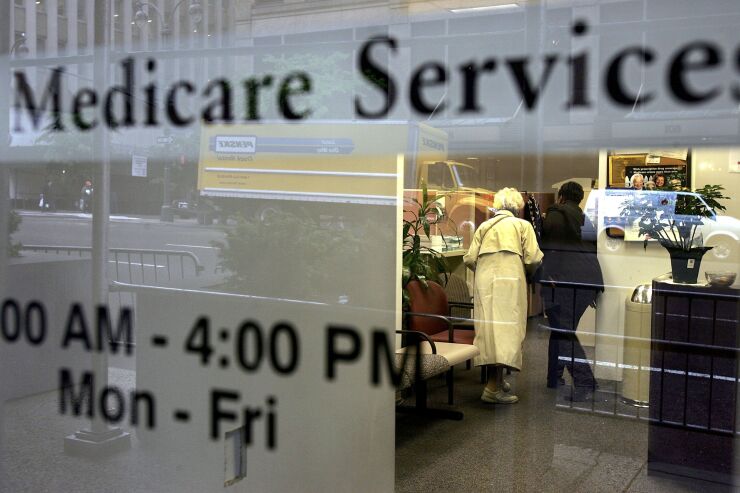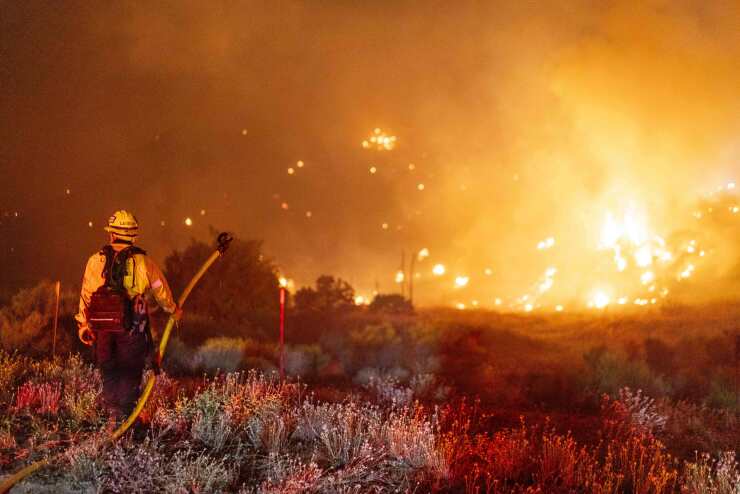Want unlimited access to top ideas and insights?
In November's roundup of pressing issues in the insurance industry, read about the Landmark data breach that impacted more than 800,000 Liberty Bankers Insurance Group policyholders, the significant jump in collision claims for battery electric vehicles, California's moratorium on wildfire-based insurance non-renewals and more.

Medicare premiums quickly outpace Social Security COLA
Article by
Seniors expecting a boost in their Social Security checks next year may be disappointed to find that Medicare is eating up most of the increase.
That's because in 2025, Medicare Part B premiums will rise more than twice as fast as Social Security's cost-of-living adjustment (COLA). According to the Centers for Medicare & Medicaid Services, next year's COLA will be 2.5%. The standard Part B premium, meanwhile, will jump by 5.9%.
Why does that matter? Because Part B premiums are automatically deducted from Social Security checks.

'Fundamental breakdown': How USAA landed in regulators' hot seat
Article by
Few companies can match USAA's stellar reputation, gained over a century of offering financial products to military members. But behind the scenes, the San Antonio bank and insurer is navigating a minefield of its own making.
USAA's banking arm has grown its customer base for years, all while failing to make the investments needed to keep both its regulators and some decades-long customers happy, according to a joint investigation by American Banker and the San Antonio Current.
A series of regulatory penalties hasn't sparked enough internal change. Neither has the reshuffling of key leaders, the latest move being the upcoming retirement of CEO Wayne Peacock. Another problem: nonexistent profits at USAA's bank, which has turned to layoffs to cut costs.

California issues eighth wildfire-based insurance non-renewal ban in 2024
Article by
A one-year moratorium on non-renewal of residential property insurance policies, issued November 14 by the California Department of Insurance and Commissioner Ricardo Lara, is just the latest of
The
The moratoriums are part of a consumer protection law authored by Lara in 2018 as a state senator. The law requires one-year moratoriums for any location where the governor has declared a state of emergency. They have been issued between July and November in each year, with eight so far in 2024, the highest number since nine were issued in 2021. According to the department, the moratoriums in 2024 (before the most recent one) collectively affect about 1 million policyholders.

Meet the insurtech: Gaya
Article by
Gaya, an insurance data entry startup founded in 2021 that gained more financing in March and June this year, arrived at its current product after pivoting from two previous ideas.
The company's co-founders Carl Ziadé, CEO, and Jean-Pierre Vertil, chief technology officer, started out with a car-sharing service they describe as being like Airbnb for cars, then shifted to making a platform for insurance agents to cross-sell auto refinancing. Ziadé and Vertil met while earning master's degrees at Stanford University's business school in 2020. They also have engineering and consulting experience.
While working on the auto refinancing idea, they found that insurance agents and brokers struggle with filling carrier portals.

The Hartford first in digital customer experience: Keynova
Article by
The Hartford continues to be first in digital customer experience, according to Keynova's 2024
Small commercial insurance carriers are prioritizing disaster preparedness and recovery options to support small businesses, according to the results. Three websites — The Hartford, State Farm and Travelers — include weather-specific content like evacuation planning and tools for businesses. Eighty percent of carriers suggest actions companies can take to prepare for a catastrophic loss.
Twenty percent offer digital inspection tools for property damages, and half of carriers have online or mobile claims filing options for business owners' policies and business property policies, according to the scorecard. Seventy percent of the analyzed carriers offer digital submissions for commercial auto insurance claims.

Advocate calls for regulation of home insurers' reinsurance deals
Article by
Reinsurance payments being made by the top homeowners insurance carriers in California should be regulated, the Consumer Watchdog advocacy organization says.
"Regulators get no look into the books of these companies, or they don't even get to see the terms of the contract," said Carmen Balber, executive director of the group. "They have no idea what the terms of the deals are."
Homeowners insurers in California contract with reinsurance companies to protect against large numbers and amounts of claims at the same time, as happens with wildfires in the state. This became a big issue with the number of wildfires in 2017 and 2018.

Landmark, Liberty Bankers Insurance data breach
Article by
Landmark Admin, a third-party administrator for life insurance and annuity companies, announced a data breach affecting more than 800,000 Liberty Bankers Insurance Group policyholders.
Landmark told policyholders in October that on or about May 13, the company detected suspicious activity. And on May 14, the company learned a third party had attempted to access its network. A forensic investigation remains ongoing but the company found evidence to suggest information was compromised, according to the data breach
Names, addresses, Social Security numbers, financial account numbers and medical information may have been accessed, according to Landmark's notice.

How insurers can guard against long-tail cyber breach events
Article by
Insurers and businesses are contending with
The damage from cyber breaches can be less from the immediate, short-tail business interruption or need to fix systems, and more from the time and resources spent on investigation, litigation and public relations communication, stated Thomas Barrett, partner in data protection and privacy at CyXcel, a cybersecurity consulting unit of U.K.-based law firm Weightmans. "It's no longer just about when your system is down, it's about everything else too," he said.
Insurers can, however, shorten the tail after a cyber breach, according to Randi Zimmer, director of cyber incident response at Epiq, a technology services provider. They can prevent incidents by proactively getting "really good information governance and an incident response plan," she said. "There's certainly a direct link between the incident response and further litigation."

Meet the insurtech: 7Analytics
Article by
Norwegian insurtech startup 7Analytics plans to bring its flood risk analysis technology to the U.S. market, according to Helge Jorgensen, co-founder and CEO.
With 4 million euro in funding led by Scale Capital in May, the startup, founded in 2020, is entering the U.S. following the severe flooding from hurricanes
7Analytics plans to bring its flood risk analysis technology to the U.S. market, according to Helge Jorgensen, co-founder and CEO.

Mitchell: EV claims rise in frequency in Q3 2024
Article by
Claims frequency for repairable collision-damaged battery electric vehicles (BEVs) rose to 3% in the U.S., a year-over-year increase of 47%, according to Mitchell's Q3 2024 Plugged-In: EV Collision Insights report. The year-to-date average of completed collision repairs for BEVs is 19.5 days, which is three days longer than, and an 18% difference from, the repair average for internal combustion engine (ICE) vehicles.
Mitchell's insights reveal that BEVs are more likely to sustain rear-end impact in the event of a collision, while traditional ICE vehicles are more likely to sustain front-end damage. On average, front-end collisions are about 40% more expensive to repair, according to Mitchell.
"There's a direct correlation between the primary point of impact and claims severity," said Ryan Mandell, Mitchell's director of claims performance, in the news release. "Even though overall severity remains higher for BEVs than for ICE vehicles, understanding these point-of-impact dynamics can help auto insurers better assess risk, manage claims and assist policyholders."





